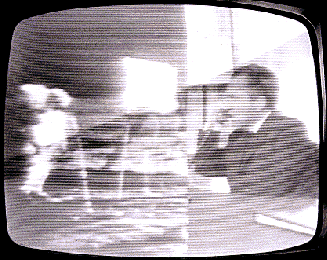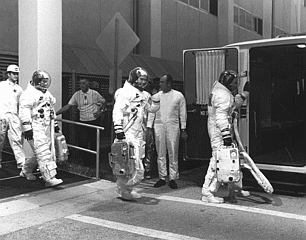Tranquility Base?

Photo coutesy of NASA.
...or Burial Monument?
A tragedy that was not meant to be
by Clint Bradford
| JFK Site | |


"Fate has ordained that the men who went to the moon to explore in peace will stay on the moon to rest in peace..."
This country celebrates the 30th anniversary of Apollo XI Neil Armstrong's and Buzz Aldrin's trip to the moon in July, 1999.
Papers housed in the National Archives indicate that the White House and NASA made behind-the-scenes plans for tragedy: what to do if the Apollo XI astronauts were stranded on the moon.
They even invented a less-offensive phrase for the plan. The stranded pair of astronauts would "close down communications" with Mission Control in Houston and be left in silence, either to die slowly or to commit suicide.
"In Event of Moon Disaster" is the name of the document. It contains the steps President Nixon would take if the lunar module couldn't successfully leave the surface of the moon. After all, the U.S. had never tried this type of maneuver it was all theoretical.

If the astronauts were deemed to be doomed, the President was to call the "widows-to-be" to express his condolences. He was then to deliver a speech to the nation. At some point, communications would be cut to the moon, and a clergyman was to commend the astronaut's souls to "the deepest of the deep" in the manner of a burial at sea.
The initial memo was drafted for H.R. Haldeman, Nixon's chief of staff, by speech writer William Safire. Safire also drafted the short speech Nixon was to give. A few years ago, Safire wrote about this secret plan:
On June 13 [1969], Frank Borman an astronaut the president liked and whom NASA had assigned to be our liaison called me to say, "You want to be thinking of some alternative posture for the president in the event of mishaps on Apollo XI." When I didn't react promptly, Borman moved off the formal language "like what to do for the widows."
Here is the entire text of Safire's speech for Nixon:
Fate has ordained that the men who went to the moon to explore in peace will stay on the moon to rest in peace.Neil Armstrong and Edwin "Buzz" Aldrin, of course, made it safely back into the command module piloted by Michael Collins, and came home. "In Event of Moon Disaster" plan was tossed into a file and was never implemented.These brave men, Neil Armstrong and Edwin Aldrin, know that there is no hope for their recovery. But they also know that there is hope for mankind in their sacrifice.
These two men are laying down their lives in mankind's most noble goal: the search for truth and understanding.
They will be mourned by their families and friends; they will be mourned by their nation; they will be mourned by the people of the world; they will be mourned by a Mother earth that dared send two of her sons into the unknown.
In their exploration, they stirred the people of the world to feel as one; in their sacrifice, they bind more tightly the brotherhood of man.
In ancient days, men looked at stars and saw their heroes in the constellations. In modern times, we do much the same, but our heroes are epic men of flesh and blood.
Others will follow, and surely find their way home. Man's search will not be denied. But these men were the first, and they will remain the foremost in our hearts.
For every human being who looks up at the moon in the nights to come will know that there is some corner of another world that is forever mankind.
Buzz Aldrin is now 69, and president of Starcraft Enterprises (and two other companies in Los Angeles), and promotes space tourism. Neil Armstrong is now 68, and a businessman in Lebanon, Ohio. Michael Collins, 68, lives in Marco Island, Fla., and enjoys his time fishing. Christopher Kraft was the Director of flight ops for the Manned Spacecraft Center. He is now 75, still living in Houston, and is writing a book. Deke Slayton (Director of flight crew operations), one of the seven Mercury astronauts, died in 1993 at age 69. Wernher von Braun died in 1977 at age 65.
